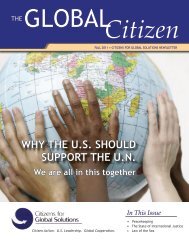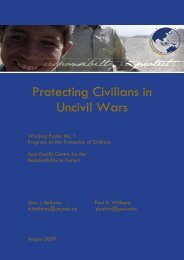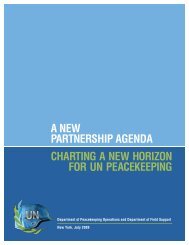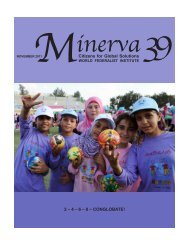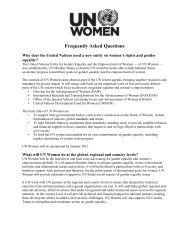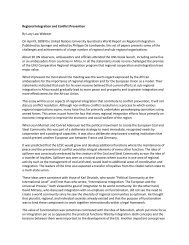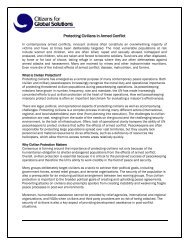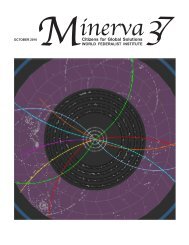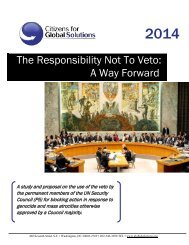Minerva, Spring 2008 (Volume 32) - Citizens for Global Solutions
Minerva, Spring 2008 (Volume 32) - Citizens for Global Solutions
Minerva, Spring 2008 (Volume 32) - Citizens for Global Solutions
Create successful ePaper yourself
Turn your PDF publications into a flip-book with our unique Google optimized e-Paper software.
The main two reasons <strong>for</strong> opposition to<br />
the creation of a world government are:<br />
(1) the fear that such an all-powerful global<br />
government could become a worldwide<br />
tyranny from which there is no escape and<br />
(2) the fear that a democratic world government<br />
controlled by the majority poor<br />
of the world would use its power to require<br />
what Yunker calls “Crude Redistribution”<br />
of the world’s wealth in order to<br />
get more equality. To nullify these fears,<br />
Yunker proposes that the world federation<br />
to be created (a) would allow participating<br />
nations to maintain whatever kind of<br />
military <strong>for</strong>ce they wish (including having<br />
nuclear weapons) and (b) would allow<br />
nations to leave the federation at any<br />
time without penalty. Additionally, in the<br />
world legislature there would be (c) a<br />
dual voting system. Separate votes would<br />
be taken on a material basis (where the<br />
number of votes a country has depends<br />
on its wealth) and on a population basis<br />
(where the number of votes a country has<br />
depends on its population. This system<br />
means that no measure could be adopted<br />
that doesn’t have the support of the rich<br />
countries, but also that no measure could<br />
be adopted that doesn’t have the support<br />
of the poor countries. Yunker believes that<br />
such a limited world government would<br />
dispel the fears which now cause opposition<br />
to a world government in the rich<br />
countries. It would also address the fears<br />
in poor countries that a world government<br />
would be a way <strong>for</strong> the rich countries to<br />
maintain and even solidify their control<br />
over the poorer, weaker countries.<br />
The other part of his proposal is the<br />
program — described and persuasively<br />
argued <strong>for</strong> in chapters 4, 5, and 6 — to<br />
gradually decrease the gap between the<br />
rich and the poor. Yunker, an economics<br />
professor at Western Illinois University,<br />
uses computer simulations to show that<br />
there is good reason to believe that over<br />
several decades the economic situation in<br />
poor countries could be substantially improved<br />
while economic growth would be<br />
slowed only slightly in rich countries. He<br />
emphasizes that both the establishment of<br />
a world government and WEEP should<br />
be viewed as experimental ef<strong>for</strong>ts which<br />
would be ended if it became apparent that<br />
they were not achieving their goals.<br />
Yunker’s argumentation <strong>for</strong> his WEEP is<br />
much more persuasive than his argumentation<br />
<strong>for</strong> world government, although he<br />
is eager to show that both are needed and<br />
that they are somewhat dependent on one<br />
another. His basic argument <strong>for</strong> world<br />
federation is that the world community<br />
has been gradually moving toward more<br />
cooperation <strong>for</strong> a long time (pp. 297-301<br />
and 307-<strong>32</strong>5) and concern about national<br />
sovereignty has been declining (p. 287).<br />
The fact that the trans<strong>for</strong>mative move to<br />
world government has not yet been made<br />
does not show that it can’t or shouldn’t be<br />
made. Yunker displays a readiness to discuss<br />
the weaknesses in his argument <strong>for</strong><br />
world federation, admitting that the world<br />
has not had many successful experiences<br />
of creating federations out of previously<br />
existing nation-states and that in a fair<br />
number of cases federations have disintegrated<br />
(pp. 289-296). But, he argues, if<br />
government is a good thing at the local<br />
level, the national level, and the regional<br />
level, why would it not be a good thing at<br />
the global level (p. 335)?<br />
Yunker’s book is full of repetitions. He<br />
admits this (p. 337), but says that it is<br />
necessary to “break through the encrusted<br />
prejudice against world government” (p.<br />
337) which has come about because of the<br />
unlimited character of the world government<br />
put <strong>for</strong>th by its previous proponents.<br />
What is needed to counter this prejudice<br />
is the recognition that the more limited<br />
kind of world government being proposed<br />
by Yunker will not arouse the fears fed by<br />
the traditional views of what a world government<br />
would be. People will see that it<br />
is possible to have the benefits of world<br />
government without arousing such fears.<br />
But there are questions that need to be addressed.<br />
Probably the most obvious one<br />
is how the Federal Union of Democratic<br />
Nations (FUDN) is any more of a government<br />
than the League of Nations or the<br />
existing United Nations. Yunker criticizes<br />
these confederal organizations <strong>for</strong> their<br />
ineffectiveness, which he blames on their<br />
not having their own military <strong>for</strong>ces, their<br />
not being able to levy taxes, and their officials<br />
being appointed by the national<br />
governments rather than being elected<br />
(p. 309). But in his proposed FUDN the<br />
national governments will be allowed to<br />
maintain their own military <strong>for</strong>ces, even<br />
with nuclear weapons, and would be free<br />
to leave the union whenever they wanted,<br />
which they would be likely to do if the<br />
FUDN ever decided to use military <strong>for</strong>ce.<br />
Consequently, the military <strong>for</strong>ces of the<br />
FUDN are likely to be virtually powerless<br />
against the more powerful nations.<br />
How would the FUDN be any less helpless<br />
than the League of Nations was? The<br />
FUDN might be able to levy taxes, but<br />
its financial resources would probably be<br />
very limited compared to those of larger,<br />
richer national governments. With regard<br />
to the election of FUDN officials, Yunker<br />
does not seem to appreciate how difficult<br />
that would be to carry out. Could laws<br />
about exactly who could vote, how much<br />
money could be spent on campaigning,<br />
and so on be en<strong>for</strong>ced throughout the<br />
whole world?<br />
The United Nations has coercive power<br />
when the Security Council approves a<br />
given course of action. Military <strong>for</strong>ce can<br />
be used against nations that attack other<br />
nations or that refuse to abide by Security<br />
Council resolutions. It is true that the<br />
permanent five have a veto, so no action<br />
can be taken against them or other nations<br />
which they support. But would the situation<br />
be any different with the FUDN as<br />
long as the individual powerful national<br />
governments are allowed to keep their<br />
military <strong>for</strong>ces and nuclear weapons?<br />
Yunker, as is so often the case with proposers<br />
of world government, fails to deal<br />
with the question of how we proceed from<br />
where we are now to the desired goal.<br />
How might the move toward the FUDN<br />
get started? Might the UN General Assembly<br />
call a conference to address the<br />
issue? Might NATO members or the European<br />
Union or some particular national<br />
governments (e.g. Australia, Brazil, Canada)<br />
take the lead in calling a conference to<br />
consider the proposal? Could anything be<br />
done if the government of the USA were<br />
opposed? Maybe Yunker thinks that his<br />
proposal is the kind that the US government<br />
could support, but un<strong>for</strong>tunately it<br />
is not easy to find a way to persuade those<br />
with great power to share their power (or<br />
their wealth) with others.<br />
47 • <strong>Minerva</strong> #<strong>32</strong> • June <strong>2008</strong>



